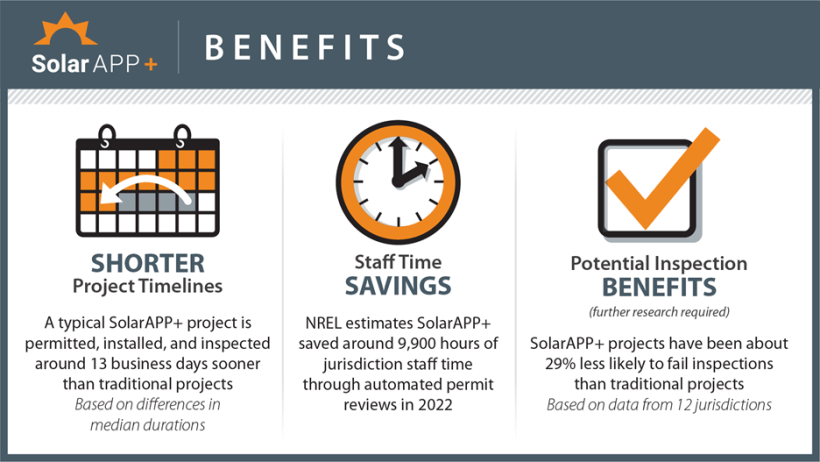
SolarApp+ has revolutionized the solar permitting process for residential installations, offering a streamlined, efficient solution to what has traditionally been a time-consuming bottleneck in the solar industry. Developed by the National Renewable Energy Lab (NREL) in collaboration with the Department of Energy’s Solar Energy Technologies Office (SETO), SolarApp+ is a free, web-based platform designed to simplify and expedite the solar permitting process. This article will delve into the latest developments of SolarApp+, its availability, benefits, and the driving forces behind its adoption. For more background information, please visit our previous overview article.
Latest Developments
As of early 2024, SolarApp+ has been instrumental in helping local governments approve nearly 33,000 solar projects. While its adoption has not reached the initial goal of 600 communities by 2023, the communities currently utilizing it have seen substantial time savings, over 33,000 hours of permitting staff time without compromising safety or code compliance (PV Magazine USA). NREL actively updates the platform to include code revisions and support for new technology (SolarAPP+™ - NREL).
Updates to the software are constantly being released to improve functionality and the API. Since April 2021, there have been up to three updates a month. SolarApp+ now offers permitting for solar systems with battery storage and effortless integration with government platforms. Some of the latest releases include enhanced error reporting, updated installer resources, and better flexibility for jurisdictions to control design and weather variables based on project location or design conditions (SolarApp+). Multiple fixes have also been made to enhance operability, address API issues and bugs, and diversify project options. All releases can be found on the SolarApp+ website in greater detail.
Why Use SolarApp+
SolarApp+ offers numerous advantages to solar installers. It enables a fast and predictable permitting process, improving customer experience, reducing project cancellations, and expanding access to renewable energy (SolarAPP+™ - NREL). For jurisdictions, it increases the number of solar permits and authorizes revenue that local governments can process without additional workloads and resource constraints (SolarAPP+™ - NREL).
The importance of SolarApp+ cannot be overstated. With solar permitting identified as an obstacle in the clean energy buildout in the US, SolarApp+ aims to lower the costs and time associated with solar permitting. The holistic permitting process can add up to $7,000 to the average PV system (SEIA). The app offers a more simplistic, streamlined process than traditional solar permitting, allowing local permit offices to collect the same fees, and facilitating market development (UL Solutions).
It accomplishes this by automatically checking system designs for safety and code compliance, thus cutting approximately 12 days off the permitting process, saving approximately 15-60 minutes per permit (PV Magazine). The app prompts installers to answer logistical, electrical, structural, and fire safety questions about the installation that are run through compliance checks for errors that flag applicants immediately. If any responses are not code-compliant, a permit is not issued, thus ensuring all approved residential systems are safe and compliant (Environment America). Some eligible projects receive immediate permit approval.

(Credit: Office of Energy Efficiency and Renewable Energy)
Availability
SolarApp+ is fully active for single-family rooftop solar systems on existing homes in certain jurisdictions across 10 states nationwide, including Colorado, Iowa, Wisconsin, Maryland, Virginia, and more. As of December 2023, 160 communities across the approved states have adopted the automated permit system. Access to SolarApp+ and state and local incentives continue gaining momentum nationwide as industry leaders and government organizations work to facilitate processes and technologies that enable universal renewable energy access.
Federal and State Incentives and Legislation
Federal and state incentives, alongside legislative efforts, are crucial drivers for the adoption of SolarApp+. The goal of the US Department of Energy to achieve 100% clean electricity by 2035 underscores the importance of reducing soft costs associated with solar installations, including permitting. SolarApp+ plays a vital role in reducing these costs and facilitating the broader adoption of renewable energy by simplifying the permitting process.
In April 2023, the Solar Access Act (SB-379) was passed in California, allowing more direct solar access for homeowners and limiting HOA and local government interference with installing residential solar systems. The act requires municipalities with more than 50,000 people to adopt SolarAPP+ and municipalities with 50,000 non-exempt people or less to fulfill this requirement by September 2024 (California Energy Commission). Cities and counties can issue permits instantaneously for residential solar systems. This program was established at the CA Energy Commission to offer grants to jurisdictions to adopt SolarAPP+.
As of late 2023, 110 municipalities applied for grants with 40 municipalities that have either adopted or are in the process of adopting the online permitting app. The application deadline has been extended to May 1, 2024. States like Colorado have also provided substantial dollars to support local governments in emphasizing the need for SolarApp+ to reach emission reduction goals over the next few years (COSSA). Arizona offers state tax breaks and federal credits for solar energy adoption, encouraging widespread endorsement of SolarApp+ (Solar Power World).
In conclusion, SolarApp+ represents a significant advancement towards a more efficient, cost-effective, and streamlined solar permitting process. Greentech Renewables has been active in supporting SolarApp+ adoption for contractor customers. To learn how to get started, visit the SolarApp+ website or contact a Greentech Renewables location near you. Our teams are subject matter experts who can guide you through the adoption process and learn more about available grants and incentive programs in your jurisdiction.